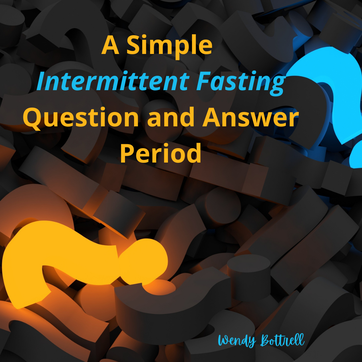 We have been discussing Intermittent Fasting this month and today we are simply sharing some questions that come up regularly on the topic. So, today's post is an Intermittent Fasting Question and Answer post. Let us know what we missed. The best of all medicines are rest and fasting. ~Benjamin Franklin What is Intermittent Fasting? It is an eating regimen that dictates periods of fasting between eating. The fasts could be certain hours a day or up to 32 hours in a row, once or twice a week. This type of fasting has shown positive health benefits in animal studies. Source: http://en.wikipedia.org/wiki/Intermittent_fasting Did you know? Intermittent fasting has been the subject of scientific study in rats since 1943. It is also known as alternate day fasting (ADF), every other day fasting (EOD), or every other day feeding (EODF). The results from these early testings showed an increased life span in rats subjected to intermittent fasting regimens. Source: http://en.wikipedia.org/wiki/Intermittent_fasting Is fasting good for you? Modern scientific studies have also shown that Intermittent Fasting (IF) is in fact as good or better than continuous calorie restriction with increased health benefits. It is also generally easier for people to restrict their intake to a few hours a day than be able to restrict their calorie intake every time they eat. Source: http://healthimpactnews.com/2013/what-the-science-says-about-intermittent-fasting/ Increase your ability to lose weight without losing muscle mass through Intermittent Fasting. New studies prove that IF increases production of Human Growth Hormone (HGH) that allows the body to rev up its metabolism while at the same time promoting muscle growth. Source: http://healthimpactnews.com/2013/what-the-science-says-about-intermittent-fasting/ What are other benefits of Intermittent Fasting? Normalizing your insulin and leptin sensitivity has been proven to help prevent the largest category of killer diseases in humans: heart disease, diabetes and even cancer. It also normalizes your ‘hunger hormone’, ghrelin; making losing weight easier on this fasting regimen. Source: http://fitness.mercola.com/sites/fitness/archive/2013/01/18/intermittent-fasting-approach.aspx Keep your brain healthy by fasting intermittently! In a recent study, the process of IF actually promotes an increase in a protein that promotes neural brain health and helps to prevent the onset of Alzheimer’s and Parkinson’s disease. The study in rats would equate a delay of up to 20 years in humans. Source: http://fitness.mercola.com/sites/fitness/archive/2013/01/18/intermittent-fasting-approach.aspx Starvation? This is not what intermittent fasting is about. Recent studies have also found that the body does not start true ‘starvation’ mode survival until about 72 hours of fasting, whereby the breakdown of proteins starts in earnest to feed the body, most of which at this point is muscle proteins. IF is periodic or every other day fasting and does not produce the same harmful effects. Plan your fasting to avoid these pitfalls. Source: http://www.muscleforlife.com/the-definitive-guide-to-intermittent-fasting/ Are you exercising regularly and still having trouble losing those few extra pounds? It may be time to start Intermittent Fasting during, before and after your workouts to ensure fat loss during your exercise regime. It has been proven in a recent study that fasting and working out can actually enhance the amount of fat loss. Source: http://www.muscleforlife.com/the-definitive-guide-to-intermittent-fasting/ Is breakfast the most important meal of the day? Evidence seems to support this fact mostly. Its mostly correct, because the body gains larger health benefits by eating a carb heavy meal directly after a fasting period due to insulin sensitivity. However, if you extend your overnight fast (sleeping) until after your workout, which also depletes insulin, when you do eat your first meal it will compound those benefits. In other words, a regular meal directly after 8, 12, or 24 hours of fasting is a health benefit. Source: http://ca.askmen.com/sports/foodcourt_700/703_intermittent-fasting.html Shouldn’t you eat smaller, more often? This has been the wisdom of the day for so long that most people take it as a guaranteed fact. However, it has never been scientifically proven that 6 small meals a day are beneficial over 2-3 regular meals. Furthermore, this constant feeding mechanism has been proven and linked to over-eating because of never feeling satiated. Since you are encouraged to eat your mind thinks you need to eat more often, which usually leads to higher caloric intake and weight gain. Source: http://ca.askmen.com/sports/foodcourt_700/703b_intermittent-fasting.html Your feedback is invaluable! We'd love to hear from you! Share your thoughts, ideas, or comments below, and let's continue to inspire each other on our paths to wellness. If you ever need guidance or support, don't hesitate to reach out. We're here to help you thrive every step of the way. Let's Build Health & Fitness - Join Our Newsletter Today & Receive the FREE Beginners Guide To Healthy Eating! Sign Up Today! https://bit.ly/42Hf0aR
0 Comments
Leave a Reply. |
Archives
April 2024
Categories |










 RSS Feed
RSS Feed
